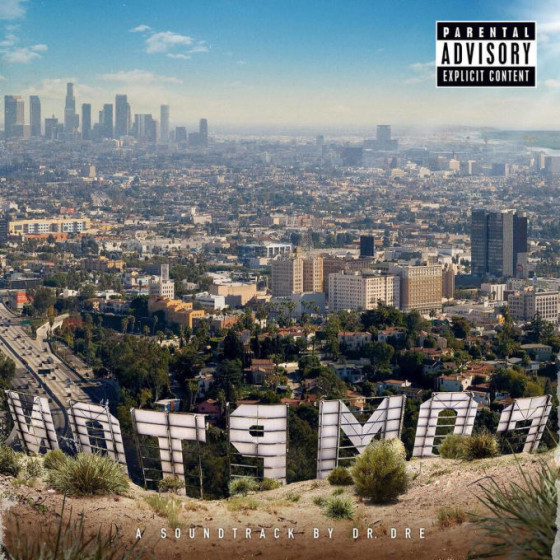After spending almost a generation in the interim between the genre-defining 2001 and what Dr. Dre now describes as his ‘Grand Finale’, the Chinese Democracy of the hip hop world has finally arrived. Compton: A Soundtrack by Dr. Dre – to give it its full title – is the product of sessions inspired by the forthcoming Straight Outta Compton biopic. Further galvanised by an effort to disassociate himself from the long-awaited, and eventually scrapped, Detox album that had seemingly lost its lustre after years of tinkering. With the self-proclaimed perfectionist jaded by the aforementioned project, the retrospective blueprint for Compton seemed to provide Dre with a fresh perspective, allowing him to combine both modern and old school elements.
With the general sense of Detox being teased on earlier tracks such as 2011’s ‘I Need A Doctor’, this hinted at the weepy balladry of the most mournful R&B tracks, and showcased a vulnerability not often revealed in hip hop circles. Dre once confessed in a rare and candid interview that he, "listens to all the whack shit" in an attempt to identify which areas should be contrary to his creative manifesto. This effective ethos has allowed him to stay ahead of the curve, while perhaps providing a sense of satisfaction that has made the music mogul almost untouchable in terms of hip hop production. Perhaps in this instance he decided to take his own advice and eventually opted to shelf the project for the sake of self-preservation.
Straight outta purgatory, Compton begins with a public broadcasting announcement highlighting the perpetual social anxieties faced in the area on a daily basis. A revisionist history lesson shoehorned in to set the tone of the album from the off before it erupts into opening track ‘Talk About It’ – a joint that seems to have flourishes of EDM style synth, and a glitchy electronic snare beat, while auto-tune rears its ugly head on the track’s Biggie Smalls inspired refrain ‘It Was All A Dream’. A combination, it could be argued, that provides a fairly tedious yet comprehensive run through the formulaic components that comprise the current climate of homogenous Teeny-Pop. However, this is clearly a song greater than the sum of its parts, as Dre is strangely able to use this to his advantage by putting his distinctive footprint all over an attempt to align himself with modern contemporaries such as Kendrick Lamar and Drake, the former of whom features heavily throughout the album.
As Compton progresses, it rarely seems to shift out of second gear, evidently favouring laid back grooves and sparse production over aggressive break beats and G-Funk swagger. All the while an almost listless lyrical style on occasion provides a narrative, or lack thereof, that confirms suspicions that Dre may have been phoning it in, quite literally, while he ironed out an exclusive distribution deal with Apple Music on the other line.
Cynicism aside, there are moments of brilliance here. ‘It’s All On Me’ has some funky guitar chops that recall the most badass of James Brown jams, while Dre attempts to rap melodically over the verse. There are also moments of nostalgia when the voice of the late Eazy E makes a surprise albeit brief cameo over the foreboding tremors and melancholy piano of ‘Darkside/Gone’ – one of the Kendrick Lamar-featuring tracks where hip hop’s latest carrier of the torch is able to flex his emceeing ability and showcase a versatile style that seamlessly finds pride of place amongst Dre’s distinctive baritone.
‘Issues’, which features Ice Cube, is one of the more abrasive moments on the record, picking up momentum as a flurry of gunshots and sirens ring out over a plaintive rock guitar. It recalls early N.W.A, Cube rapping, ‘Ride through the time, you know my name, you know my reputation, you know what it is I don’t need to give no explanation’. On the other hand, ‘Deep Water’ is a track that confirms Kendrick Lamar as one of the stars of the album. Previously dubbed as a pretender to the throne, the young rapper effortlessly squeezes Snoop Dogg out of his previously occupied position as Dre’s wingman, running rings round the production in the process with his effortless flow.
With the gauntlet thrown down, Snoop drops in and then quickly drops out after the first verse on ‘One Shot One Kill’ – one of the few tracks here suitable for bouncing around in your pimped out low-rider if you’re that way inclined. The less said about that toe-curling Money Supermarket advert here the better. Eminem then makes his inevitable appearance on the lyrical aerobics of penultimate track ‘Medicine Man’. Blending the rapper’s confessional style with his algebraic wordplay, while Dre concludes on ‘Talking To My Diary’ reflecting on his self-built empire and reminiscing about the good old days – standard fare.
While some aspects of Compton are hard to swallow on first listen, this is no doubt due to the listener’s inability to make the instantaneous transit between different decades that spans the rappers career. Without a comprehensive timeline allowing us to see Dre evolve as an artist – due to his limited back catalogue of releases and lengthy period between each – we are instead given brief snapshots of a time and place where we try to rationalise whether this is something still relevant within the current cultural fabric. While The Chronic and 2001 were able to cultivate and define both the landscape and counter-culture that surrounded them, its unclear at the moment whether Compton will be able to have the same impact, given how highly saturated Dre’s ubiquitous influence is across the corporate business infrastructure of the industry at present.
<div class="fb-comments" data-href="http://thequietus.com/articles/18516-dr-dre-compton-review-2” data-width="550">


